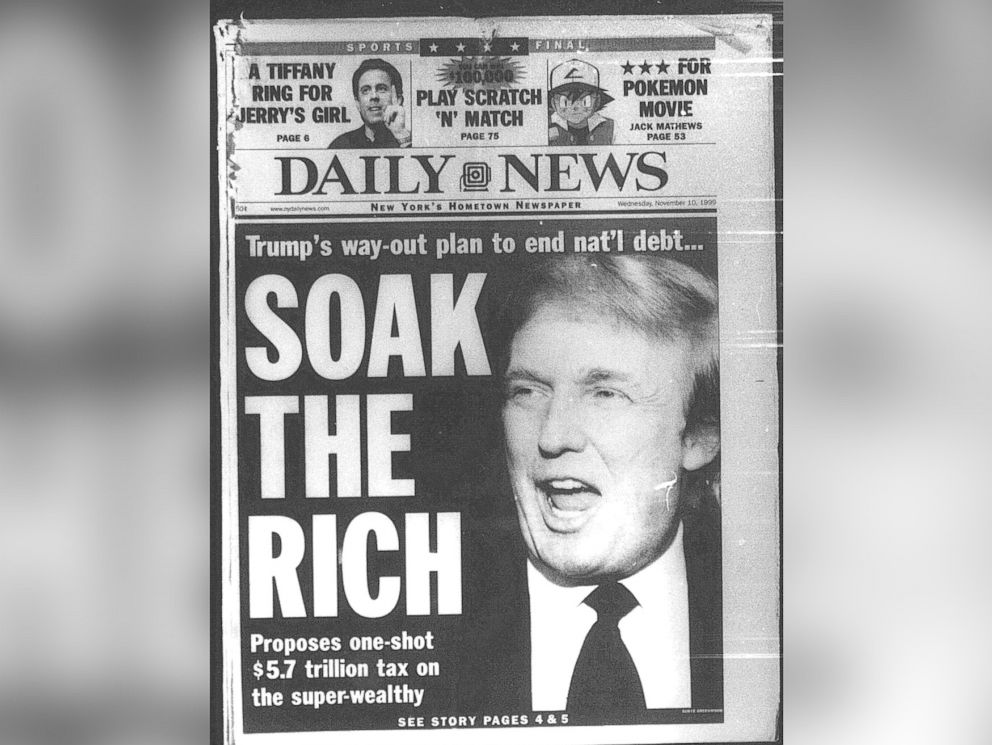
Alan: Given Trump's continual flip-flopping (in the last week alone he has flip-flopped on taxes, the minimum wage and national bankruptcy as a way to deal with the debt), why would minimally sane people think that what he says now would "hold" after the November election?
Of course, s-trump-ets are not minimally sane people.
The National Lunacy began on 9/11 and the fever has yet to break.
"Are Republicans Insane?" Best Pax Posts
"Are Republicans Insane?" Best Pax Posts
McArthur Wheeler: Patron Saint Of American "Conservatism"
McArthur Wheeler: Patron Saint Of American "Conservatism"
Moderate Republican For Trump: Only Trump Can Restore GOP Sanity... By A Landslide Loss
Political Incorrectness: Taking A Page From "The Donald's" Playbook
Trump And Taxes
Paul Krugman
This seems to be the week for Trump tax mysteries. One mystery is why Donald Trump, unlike every other major party nominee in modern times, is refusing to release his tax returns. The other is why, having decided that he needs experts to clean up his ludicrous tax-cut proposals, he chose to call on the services of the gang that couldn’t think straight.
On the first mystery: Mr. Trump’s excuse, that he can’t release his returns while they’re being audited, is an obvious lie. On the contrary, the fact that he’s being audited (or at least that he says he’s being audited) should make it easier for him to go public — after all, he needn’t fear triggering an audit! Clearly, he must be hiding something. What?
It could be how little he pays in taxes, a revelation that hurt Mitt Romney in 2012. But I doubt it; given how Mr. Trump rolls, he’d probably boast that his ability to game the tax system shows how smart he is compared to all the losers out there.
So my guess, shared by a number of observers, is that the dirty secret hidden in those returns is that he isn’t as rich as he claims to be. In Trumpworld, the revelation that he’s only worth a couple of billion — maybe even less than a billion — would be utterly humiliating. So he’ll try to tough it out. Of course, if he does, we’ll never know.
Meanwhile, however, we can look at the candidate’s policy proposals. And what has been going on there is just as revealing, in its own way, as his attempt to dodge scrutiny of his personal finances.
The story so far: Last fall Mr. Trump suggested that he would break with Republican orthodoxy by raising taxes on the wealthy. But then he unveiled a tax plan that would, in fact, lavish huge tax cuts on the rich. And it would also, according to nonpartisan analyses, cause deficits to explode, adding around $10 trillion to the national debt over a decade.
Now, the inconsistency between Mr. Trump’s rhetoric and his specific proposals didn’t seem to hurt him in the Republican primaries. Neither did the wild irresponsibility of those specifics, perhaps because all the major contenders for the G.O.P. nomination were proposing huge, budget-busting tax cuts for the rich. True, none of them were quite as off the charts as the Trump plan, but such distinctions were probably lost on primary voters — $4 trillion, $10 trillion, who cares?
Having secured the nomination, however, Mr. Trump apparently feels the need to seem more respectable. The goal, I suspect, is to bring the headline numbers down enough to let the media’s propensity for false equivalence kick in. Hillary Clinton has a plan that actually adds up, while Donald Trump has a plan that will cost $4 trillion, but which he claims is deficit-neutral? Hey, it’s the same thing!
Oh, and meanwhile he suggested once again that he might raise taxes on the rich, then walked it back, with credulous media eating it all up.
But what’s really interesting is whom, according to Politico, Mr. Trump has brought in to revise his plans: Larry Kudlow of CNBC and Stephen Moore of the Heritage Foundation. That news had economic analysts spitting out their morning coffee all across America.
For those who don’t follow such things, Mr. Kudlow has a record of being wrong about, well, everything. In 2005 he ridiculed “bubbleheads who expect housing-price crashes in Las Vegas or Naples, Florida, to bring down the consumer, the rest of the economy, and the entire stock market” — which was exactly what happened. In 2007 he predicted three years of “Goldilocks” prosperity. And on and on.
Mr. Moore has a comparable forecasting record, but he also has a remarkable inability to get facts straight. Perhaps most famously, he once attempted to rebut, well, me with an article detailing the supposed benefits of state tax cuts; incredibly, not one of the many numbers in that article was right.
So why would Mr. Trump turn to these of all people to, ahem, fix his numbers?
It could be a peace offering, an attempt to reassure insiders by bringing in Mr. Kudlow and Mr. Moore, who are influential members of the Republican establishment — which incidentally tells you a lot about their party.
But my guess is that the explanation is simpler: The candidate has no idea who is and isn’t competent. I mean, it’s not as if he has any independent knowledge of economics, or even knows what he doesn’t know. For example, he keeps asserting that America has the world’s highest taxes, when we’re actually at the bottom among advanced nations.
So he probably just went with a couple of guys he’s seen on TV, assuming that they must be there because they know their stuff.
Now, you might wonder how someone that careless and incurious was such a huge success in business. But one answer is, how successful was he, really? What’s in those tax returns?
No comments:
Post a Comment